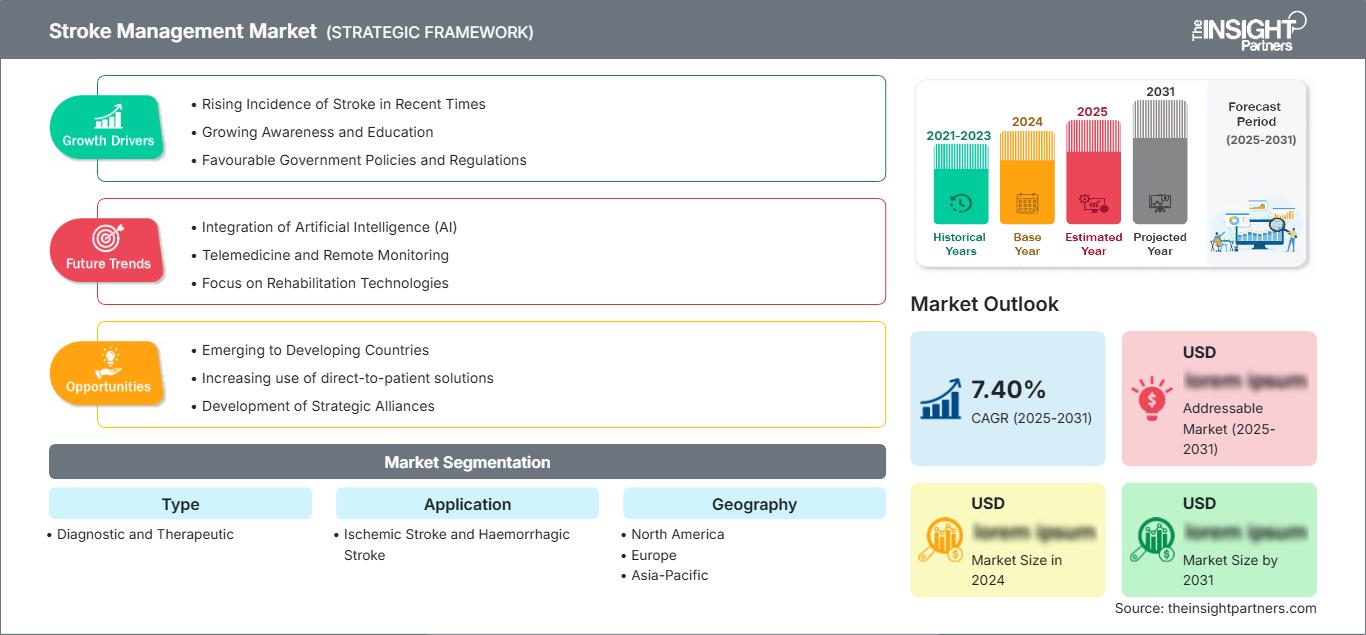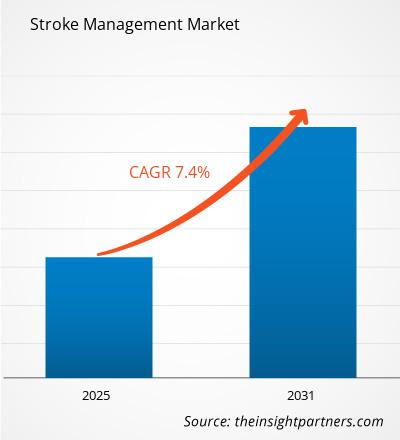Stroke Management Market Analysis, Size, and Share by 2031
Stroke Management Market Size and Forecasts (2021 - 2031), Global and Regional Share, Trends, and Growth Opportunity Analysis Report Coverage: by Type (Diagnostic and Therapeutic) and Application (Ischemic Stroke and Haemorrhagic Stroke), and Geography (North America, Europe, Asia Pacific, and South and Central America)
Historic Data: 2021-2023 | Base Year: 2024 | Forecast Period: 2025-2031- Report Date : Mar 2026
- Report Code : TIPRE00003527
- Category : Life Sciences
- Status : Upcoming
- Available Report Formats :


- No. of Pages : 150
The Stroke Management Market size is expected to reach US$ 71.1 billion by 2031. The market is anticipated to register a CAGR of 7.0% during 2025-2031.
The report presents an analysis based on type (diagnostic and therapeutic). The report further provides analysis based on application (ischemic stroke and haemorrhagic stroke). The global analysis is further broken-down at regional level and major countries. The market size and forecast at global, regional, and country levels for all the key market segments are covered under the scope. The report offers the value in USD for the above analysis and segments. The report provides key statistics on the market status of the key market players and offers market trends and opportunities.
Purpose of the Report
The report Stroke Management Market by The Insight Partners aims to describe the present landscape and future growth, top driving factors, challenges, and opportunities. This will provide insights to various business stakeholders, such as:
- Technology Providers/Manufacturers: To understand the evolving market dynamics and know the potential growth opportunities, enabling them to make informed strategic decisions.
- Investors: To conduct a comprehensive trend analysis regarding the market growth rate, market financial projections, and opportunities that exist across the value chain.
- Regulatory bodies: To regulate policies and police activities in the market with the aim of minimizing abuse, preserving investor trust and confidence, and upholding the integrity and stability of the market.
Stroke Management Market Segmentation Type
- Diagnostic and Therapeutic
Application
- Ischemic Stroke and Haemorrhagic Stroke
Customize This Report To Suit Your Requirement
Get FREE CUSTOMIZATIONStroke Management Market: Strategic Insights

-
Get Top Key Market Trends of this report.This FREE sample will include data analysis, ranging from market trends to estimates and forecasts.
Stroke Management Market Growth Drivers
- Rising Incidence of Stroke in Recent Times: The increase in the number of stroke cases and stroke related disabilities is a major market driver. With advancement in age of the populace and factors related to changing lifestyles associated with health care concerns, the need to incorporate effective solutions for the management of stroke is on the rise.
- Growing Awareness and Education: More individuals understand what the symptoms of stroke are and how important it is to act promptly. Involvement of the public in health campaigns and educating people regarding the disease enables them to seek treatment faster, which is a critical factor in ensuring better recovery outcomes.
- Favourable Government Policies and Regulations: Investments and new advancements are encouraged in the market as various authorities have allowed the development of therapies and technologies used in managing stroke patients.
Stroke Management Market Future Trends
- Integration of Artificial Intelligence (AI): AI is useful in the diagnosis of stroke and in the formulation of the appropriate management plan. Sophisticated algorithms are capable of evaluating images and forecasting the outcome of a given patient hence enhancing the management of the patient. Suppliers of devices that leverage AI technology in their performance stand a better chance of winning the trust of the clinicians, particularly in the provision of diagnostics and treatment.
- Telemedicine and Remote Monitoring: Telemedicine is revolutionizing stroke care practices by providing the possibility for consultations and follow up care over distance. This trend facilitates prompt interventions and managementsReport Scope
Stroke Management Market Regional Insights
The regional trends and factors influencing the Stroke Management Market throughout the forecast period have been thoroughly explained by the analysts at The Insight Partners. This section also discusses Stroke Management Market segments and geography across North America, Europe, Asia Pacific, Middle East and Africa, and South and Central America.
Stroke Management Market Report Scope
By Application- Ischemic Stroke and Haemorrhagic Stroke
- UK
- Germany
- France
- Russia
- Italy
- Rest of Europe
- China
- India
- Japan
- Australia
- Rest of Asia-Pacific
- Brazil
- Argentina
- Rest of South and Central America
- South Africa
- Saudi Arabia
- UAE
- Rest of Middle East and Africa
Report Attribute Details Market size in 2024 US$ XX Billion Market Size by 2031 US$ 71.1 billion Global CAGR (2025 - 2031) 7.0% Historical Data 2021-2023 Forecast period 2025-2031 Segments Covered By Type - Diagnostic and Therapeutic
Regions and Countries Covered North America - US
- Canada
- Mexico
Market leaders and key company profiles - Abbott Laboratories
- B Braun Melsungen AG
- Boston Scientific Corp.
- Bristol-Myers Squibb
- Cardinal Health
- Medtronic Plc.
- GlaxoSmithKline Plc.
- GE Healthcare
- Merck
Stroke Management Market Players Density: Understanding Its Impact on Business Dynamics
The Stroke Management Market is growing rapidly, driven by increasing end-user demand due to factors such as evolving consumer preferences, technological advancements, and greater awareness of the product's benefits. As demand rises, businesses are expanding their offerings, innovating to meet consumer needs, and capitalizing on emerging trends, which further fuels market growth.

- Get the Stroke Management Market top key players overview
Frequently Asked Questions
1.Rising Incidence of Stroke in Recent Times
2. Growing Awareness and Education
3.Favourable Government Policies and Regulations
Mrinal is a seasoned research analyst with over 8 years of experience in Life Sciences Market Intelligence and Consulting. With a strategic mindset and unwavering commitment to excellence, she has built deep expertise in pharmaceutical forecasting, market opportunity assessment, and developing industry benchmarks. Her work is anchored in delivering actionable insights that empower clients to make informed strategic decisions.
Mrinal’s core strength lies in translating complex quantitative datasets into meaningful business intelligence. Her analytical acumen is instrumental in shaping go-to-market (GTM) strategies and uncovering growth opportunities across the pharmaceutical and medical device sectors. As a trusted consultant, she consistently focuses on streamlining workflow processes and establishing best practices, thereby driving innovation and operational efficiency for her clients.
- Historical Analysis (2 Years), Base Year, Forecast (7 Years) with CAGR
- PEST and SWOT Analysis
- Market Size Value / Volume - Global, Regional, Country
- Industry and Competitive Landscape
- Excel Dataset
Recent Reports
Related Reports
Testimonials
The Insight Partners' SCADA System Market report is comprehensive, with valuable insights on current trends and future forecasts. The team was highly professional, responsive, and supportive throughout. We are very satisfied and highly recommend their services.
RAN KEDEM Partner, Reali Technologies LTDsI requested a report on a very specific software market and the team produced the report in a few days. The information was very relevant and well presented. I then requested some changes and additions to the report. The team was again very responsive and I got the final report in less than a week.
JEAN-HERVE JENN Chairman, Future AnalyticaWe worked with The Insight Partners for an important market study and forecast. They gave us clear insights into opportunities and risks, which helped shape our plans. Their research was easy to use and based on solid data. It helped us make smart, confident decisions. We highly recommend them.
PIYUSH NAGPAL Sr. Vice President, High Beam GlobalThe Insight Partners delivered insightful, well-structured market research with strong domain expertise. Their team was professional and responsive throughout. The user-friendly website made accessing industry reports seamless. We highly recommend them for reliable, high-quality research services
YUKIHIKO ADACHI CEO, Deep Blue, LLC.This is the first time I have purchased a market report from The Insight Partners.While I was unsure at first, I visited their web site and felt more comfortable to take the risk and purchase a market report.I am completely satisfied with the quality of the report and customer service. I had several questions and comments with the initial report, but after a couple of dialogs over email with their analyst I believe I have a report that I can use as input to our strategic planning process.Thank you so much for taking the extra time and making this a positive experience.I will definitely recommend your service to others and you will be my first call when we need further market data.
JOHN SUZUKI President and Chief Executive Officer, Board Director, BK TechnologiesI wish to appreciate your support and the professionalism you displayed in the course of attending to my request for information regarding to infectious disease IVD market in Nigeria. I appreciate your patience, your guidance, and the fact that you were willing to offer a discount, which eventually made it possible for us to close a deal. I look forward to engaging The Insight Partners in the future, all thanks to the impression you have created in me as a result of this first encounter.
DR CHIJIOKE ONYIA MANAGING DIRECTOR, PineCrest Healthcare Ltd.Reason to Buy
- Informed Decision-Making
- Understanding Market Dynamics
- Competitive Analysis
- Identifying Emerging Markets
- Customer Insights
- Market Forecasts
- Risk Mitigation
- Boosting Operational Efficiency
- Strategic Planning
- Investment Justification
- Tracking Industry Innovations
- Aligning with Regulatory Trends




















 Get Free Sample For
Get Free Sample For